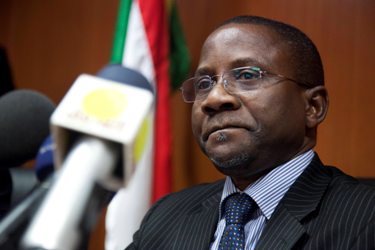Darfur crimes are tried in ordinary courts, says UN rights expert
February 10, 2013 (KHARTOUM) – Darfur war crimes are being tried by ordinary courts, said UN human rights expert in Sudan Mashood Adebayo Baderin who expressed concerns over the lack of special courts.

The special court, in line with the DDPD, applies Sudanese criminal law, international criminal law and international humanitarian and human rights laws. However, ordinary courts cannot prosecute these cases based on international law.
“I note with concern that Darfur conflict related crimes are currently being tried in the ordinary courts and that human rights officers have been denied access to these trials”, Baderin told reporters in a press statement released at the end of his second visit to Sudan.
He further urged the Sudanese government to ensure that the special courts for crimes committed in Darfur “are made operational and that national and international observers are allowed unhindered access to ongoing trials”.
In December 2012, the special prosecutor for crimes committed in Darfur informed the African Union-United Nations Mission in Darfur (UNAMID) that he had opened investigations into 10 cases, among them crimes committed in 2005, 2010, 2011 and 2012, said a recent report by the UN chief to the security council.
The special expert who spent a week in Sudan between Khartoum and Al-Fasher visited Abu Shouk IDP camp outside the state capital where he was briefed about the problems the residents are facing. He further said that the camp’s community leaders expressed “their hope to return to their places of origin”.
He was also keen to mention that Sudanese authorities allowed him to visit all the places, persons and institutions he had requested.
During an earlier visit to Sudan in June 2012, Baderin had been prevented from visiting Darfur. The Sudanese authorities at the time said the time limit was too short to make the necessary arrangements for the visit.
Baderin’s mandate is to assess and verify the human rights situation in Sudan in order to determine the technical assistance and capacity building needs of the government. He will present a final report to the Human Rights Council next September.
In his four-page statement, the expert regretted the ban on civil society groups in Khartoum and called on the Sudanese government to desist from such actions.
“I again call on the government to allow civil society organisations to operate freely, to respect the right to freedom of assembly, the freedom of expression, press freedom and also create an enabling environment of free and open political discourse in the ongoing constitutional making process”, he said.
(ST)
